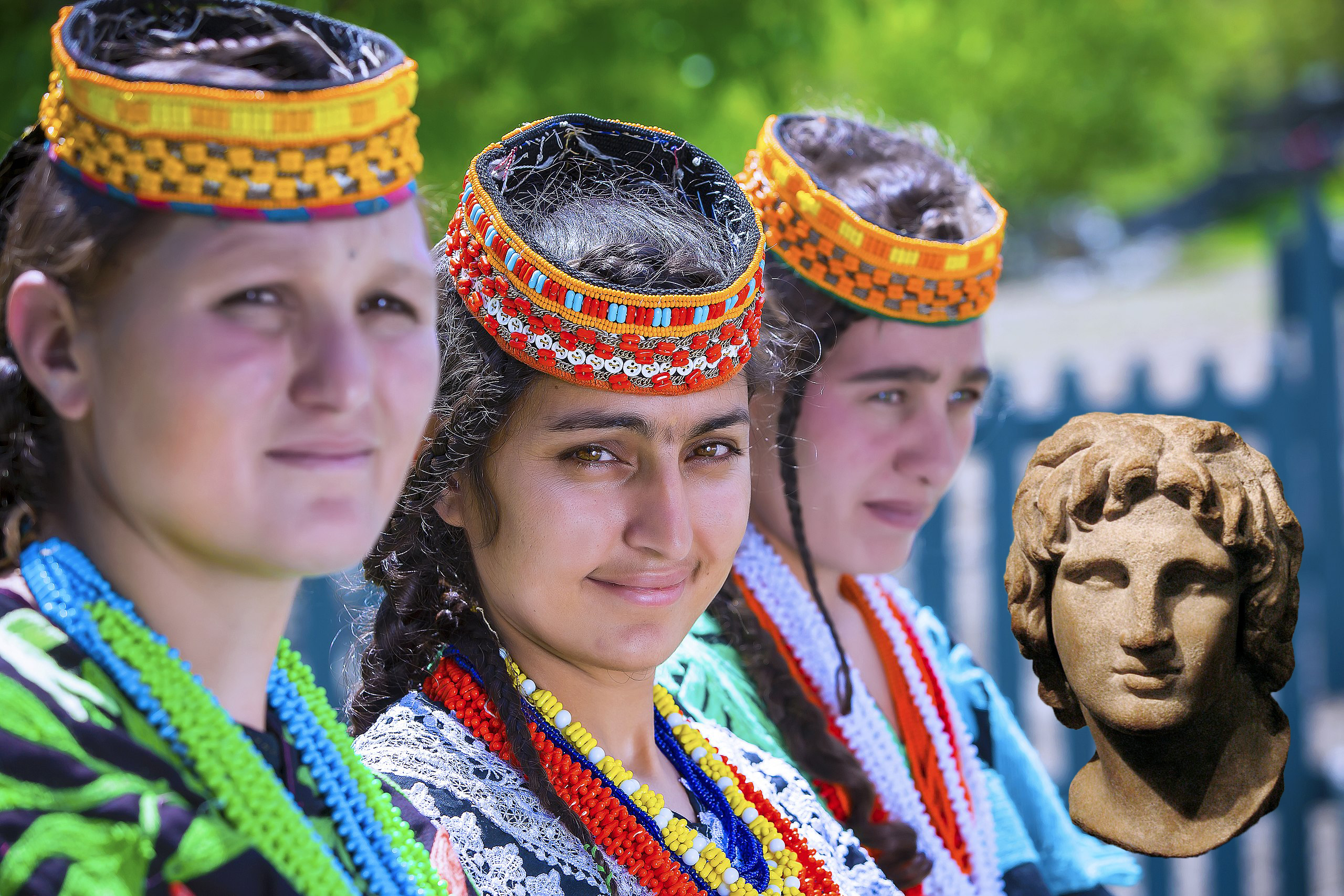 iversity within our world, represented by different cultures and traditions, is what makes humanity so interesting. There are so many remote communities that have simply been lost in time. One of them, however, which almost no one knows about is the amazing Kalash tribe, also believed to be the descendants of Alexander the Great.
iversity within our world, represented by different cultures and traditions, is what makes humanity so interesting. There are so many remote communities that have simply been lost in time. One of them, however, which almost no one knows about is the amazing Kalash tribe, also believed to be the descendants of Alexander the Great.
A weird and enigmatic village known as the Kalash dwells deep in the Hindu Kush mountains, nestled beneath the Birir and Rumbur valleys. With a population of only 5,000 people, they are among the most unusual people in Pakistan and the globe.
The Macedonian roots of Kalash tribe
They speak a language that no one else understands and follow an uncannily similar religion to that of Ancient Greece. Despite being surrounded for generations by Muslim neighbors, they have managed to keep their animistic beliefs.
Their vibrant clothes and unusual celebrations have piqued people’s interest worldwide, mainly because they stand out from the rest of Pakistan’s population. Some claim they are descended from Alexander the Great’s troops and have managed to keep their identity due to their isolated location.
Alexander the Great (356-323 BCE) was the famous Macedonian monarch who conquered the Persians and ended the Achaemenid Empire. But his conquests brought him all the way to India, where he fought his final pitched battle on the banks of the Hydaspes River.
Despite living so far away from home, one item is frequently overlooked. Governing such a vast territory would have necessitated a massive army. Alexander spent two years pacifying Bactria, which currently borders Afghanistan and Pakistan, before departing for India. He left roughly 13,500 Greeks there, many of whom established and stayed long after he had left.
Alexander’s empire was divided into regional kingdoms after his death. One of these, administered by his general Seleucus, encompassed the eastern half of the country, including Bactria.
This region will eventually split off and become known as the Greco-Bactrian Kingdom. In little than a century, the young kingdom expanded its domains into western Punjab and remained one of the most powerful in the region.
Bactria, often known as the Land of a Thousand Cities, was an island of Greek culture in the east that flourished through trade. However, like many great kingdoms, it would fall to foreign invaders.
Bactria had over one million people by the time a nomadic steppe group known as the Yuezhi came in the first century BCE. The past kings were exiled, but their descendants ruled over the remains of the long-forgotten country, with the last Indo-Greeks governing until 10AD.
Ancient Greeks in Asia
The appearance of the Kalash is maybe the most distinguishing attribute. They have a light complexion, blonde hair, and blue eyes, and they don’t resemble the natives surrounding them. But, looks is not the only distinctive feature, and experts have looked into the Kalash people’s language and Genes to discover if there is a link to Greece.
Although the Kalash language has the same Indo-Aryan root as Greek, the two languages are so widely apart that any overlap before Alexander the Great seems implausible.
Nonetheless, the genetic makeup of the Kalash distinguishes them from other populations. Researchers discovered relatively little Greek impact in the Kalash’s Y-chromosome, accounting for only about 6% of their genetic makeup.
However, when the female line of the Kalasha was examined, it was discovered that a bigger fraction appeared to have originated from the border between Asia and Europe, implying a possible link to Macedonia. There haven’t been many studies to back up this notion, however some Pathans in Afghanistan have a significant genetic overlap with Greeks.
Kalash rites include the usage of numerous sacred liquids, including wine, implying a possible link with the Greek god of wine, Dionysos.
They also believe in the Palaloiy underworld, which is linked to the present world through a metal pillar in an ancient Kalash temple. Might this be Tartarus, the mythical underworld of the Greeks?
It’s impossible to say whether the Kalash religion absorbed parts of Greek mythology, especially given that both adhere to an ancient kind of polytheism. But, in any case, the Greeks of Bactria would have left their imprint.
To say the least, whether that mark survived another 2,000 years is questionable.
As Marco Polo recounted his travels in the 13th century, he noticed that the royal line of Badakhshan descended directly from Alexander’s marriage with Darius’ daughter. Since then, all rulers of that line have been known as Zulkarnein in his honor.
Secret British archives from 1891 revealed that a delegation of Kalash requested shelter from Pathan invasion centuries later. They claimed that their clan was of European heritage and that Alexander the Great brought their ancestors with him.
Despite their apparent ties to Alexander, Pakistani geneticist Dr Qasim Ayub established through DNA tests that the Kalasha people are not of Greek heritage.
We may never know their exact beginnings, but that doesn’t mean the Kalash aren’t unique. Their old traditions and practises have been passed down through generations, and their distinct way of life has won them a place on the UNESCO list of protected cultures.
Avid Writer with invaluable knowledge of Humanity!
Upcoming historian with over 30 million views online.
“You make your own life.”





